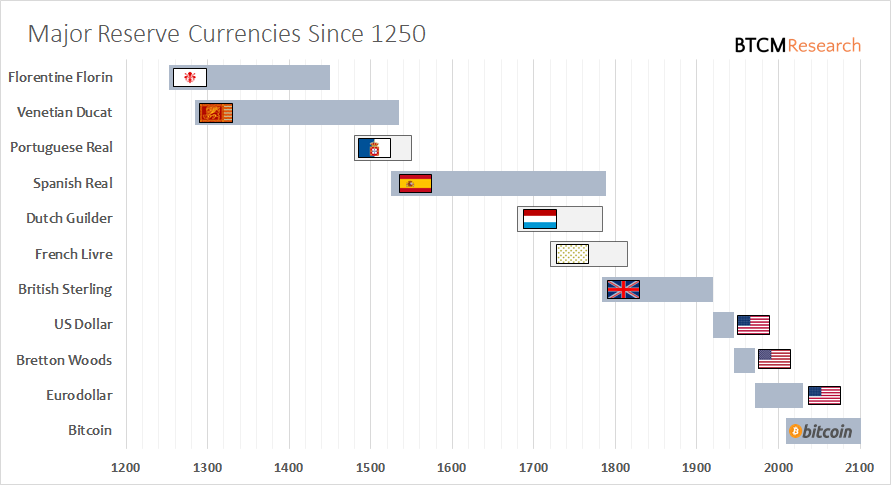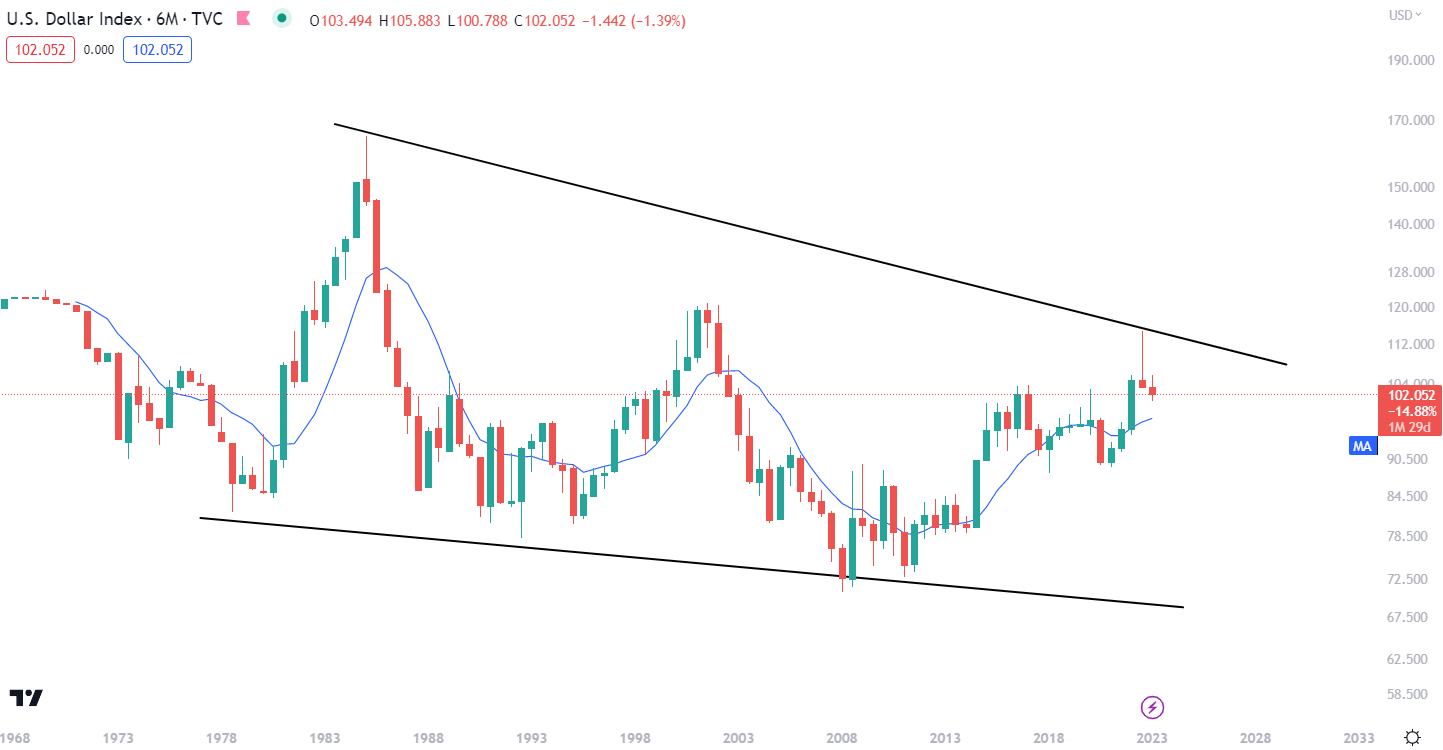This Is Why Bitcoin Can Become A Global Reserve Currency
Bitcoin has moved from an ‘underground’ digital coin to a mainstream asset in a little over a decade. But, can it go one step further and become a global reserve currency?
Key takeaways:
- Many believe that Bitcoin can become the next world reserve asset as it is increasingly being adopted by individuals and organizations globally.
- Bitcoin can be used to complete quicker and cheaper transactions across borders, but it needs to overcome regulation, volatility, and scalability.
- Reserve currency status would lead to higher BTC prices and a devaluation of the US dollar.
TABLE OF CONTENTS
The world’s most sought-after cryptocurrency was once a niche asset only favored by tech enthusiasts, but not anymore. Bitcoin is now on the balance sheet of major financial institutions. So, with regions now actively looking for alternatives to USD, some believe that Bitcoin has what it takes to become the next world reserve currency. This article will explain if Bitcoin can become a global reserve currency, what challenges it needs to overcome, and what it will mean for the price.
Can Cryptocurrency Become a Reserve Currency?
It is not surprising that the idea of a cryptocurrency being used as the next reserve currency is now being talked about on the world stage, considering the benefits of cryptocurrencies trump traditional fiat currencies in so many ways. Digital assets are quicker to send and can be transferred for much cheaper. Additionally, the decentralized ethos of cryptocurrencies makes them far less susceptible to political influence and manipulation which is attractive for a reserve currency.
However, price volatility and lack of regulation remain significant roadblocks. The lack of centralized control and the limited supply make many governments nervous about using them. As seen by traditional finance, cryptocurrencies also offer very little tangible backing. This is not to say cryptocurrencies have no reason to hold value and become a potential global currency. They do, but traditional fiat currencies are backed by a country’s economy or government and, therefore, have an air of ‘security’ around them.
Most cryptocurrencies can’t offer that. But as political agendas shift and new regions of economic growth materialize, perhaps countries all around the world might start to look toward a truly decentralized digital solution, Bitcoin.

Will Bitcoin Become the Global Reserve Currency?
There is no arguing that Bitcoin has gained a mammoth fan base in recent years. Retail adoption continues to grow. Merchants globally continue to offer it as a quicker and cheaper payment solution, and institutions that work with billions of dollars are even adding it to their balance sheets. But, the jump to becoming the next reserve currency is a big one. The coin’s untamed volatility, a lack of unified global regulation, and limited supply all pose challenges to Bitcoin's worldwide adoption.
Many argue that Bitcoin's decentralized ethos and ability to move wealth across borders make it an ideal candidate for a global asset. But, many others argue that trusting a digital asset where no one is in control is a big risk for Bitcoin. One thing is more certain. Until the topic of Bitcoin is far less polarizing, it might be some time before we see it adopted as a global asset in the future.
We Can Expect This To Happen if Bitcoin is the Reserve Currency
If Bitcoin became the world’s reserve currency, it would have a colossal impact on global economies. Here are a few examples of what would happen:
- It would signify the greatest shift away from traditional finance we have ever witnessed. Unlike the Federal Reserve and USD, there would be no single entity controlling supply and policy. The independent influence of particular governments and central banks would be a thing of the past.
- Bitcoin's borderless transactions could also facilitate international trade on a scale never witnessed before. Alongside reduced transaction costs, merchants and traders could enjoy cheap Bitcoin transaction fees, faster international settlement processing times, all with complete permanence.
- Finally, if Bitcoin were globally adopted, its value would undoubtedly skyrocket. As more countries began to use the coin, demand would increase. As the coin’s supply is capped, its price would need to increase to accommodate the higher demand.
However, it would be naive to think this scenario would be rosy for everyone. If Bitcoin became the asset that countries turned to, the US dollar would lose significant market share, which severely hurt the US economy – and all other economies associated (which is a lot). Domino-like repercussions would likely be felt for a very long time.
Possible Ways Bitcoin Becomes the World’s Reserve Currency
Bitcoin overthrowing the dollar’s reserve currency status may be a challenge shortly, but there are a few different ways that it may happen. Let’s examine three different scenarios.
- Scenario 1. Countries with struggling economies could turn to Bitcoin as a store of value than their currencies. If more and more economies adopt a Bitcoin standard, others in the world may be left with no choice but to accept it.
- Scenario 2. A global financial crisis seems to be one of the more likely scenarios that could result in economies running to Bitcoin. We witnessed investors running to Bitcoin during the banking turmoil of 2023. If a financial crisis was large enough to shake confidence in national currencies Bitcoin could benefit as a recession-proof asset and a worthy alternative.
- Scenario 3. The third and final scenario involves trust. If Bitcoin's technological advancements and increased mainstream adoption lead to greater trust and acceptance by governments and central banks, it could potentially pave the way for it to become a globally recognized asset.
Challenges Bitcoin Needs to Overcome Before Becoming a Reserve Currency
There are four key obstacles that Bitcoin needs to overcome before it can become a world reserve currency. These four obstacles include regulatory acceptance, scalability, volatility, and security.
- Regulatory acceptance. Without widespread regulatory acceptance across different countries, Bitcoin can go nowhere. There is a complete lack of uniformity in the way governments regulate cryptocurrencies, which means there is no one-way countries complete crypto payments. Without uniformity in the approach to digital assets, Bitcoin will not be able to be globally adopted, with some Governments even opting to ban Bitcoin.
- Scalability. Despite the best efforts of Bitcoin developers, the blockchain can only handle a limited number of transactions. It is not infinitely scalable and solutions like Bitcoin’s Lightning Network still come with associated problems.
- Volatility. High volatility is what draws many investors to Bitcoin. However, high volatility is not typically a feature of reserve currencies. The US dollar – for the most part – is extremely stable.
- Security. Bitcoin’s decentralized network has never been hacked or attacked in any way. However, governments and countries might find it difficult to put their faith in a network where they cannot verify the security. Bitcoin developers will need to continually pivot to stay ahead of advances such as quantum computing.
The Value of Bitcoin if it Became the World’s Reserve Currency
Anyone’s guess would really be as good as the next here. But to provide a baseline, some experts around the world have tried to provide some educated guesses. The super optimistic Bitcoin maxis of the world think a market capitalization of $500 trillion is not out of the realm of possibility. To reach this loft goal, Bitcoin would need to provide the backing for pretty much everything financial-based – stocks, real estate, derivatives, global payments – everything.
Using Bitcoin’s maximum capped circulating supply of 21 million BTC (which is now likely much lower), a market capitalization of $500 trillion would result in an incredible price per coin of $23,809,000.
Others are slightly less optimistic about Bitcoin’s future and state that the coin’s application will be more limited. Many believe the coin will reach a market value of gold, which is approximately $5 trillion. Using the same assumptions as the calculation above, a market capitalization of $5 trillion would result in a price per coin of $238,000. While it’s exciting to speculate about 100x returns from today’s prices, it is worth remembering that such estimates are completely speculative.
Pros and Cons of Bitcoin as the World’s Reserve Currency
| Pros | Cons |
|---|---|
| Bitcoin as a reserve currency would not be controlled by a single central authority | The number of daily transactions completed in USD runs into the billions – a figure that the Bitcoin network would find hard to accommodate. |
| Bitcoin can be used by anyone with an internet connection which will make it far more accessible than the US dollar | While efforts are being made to use renewable options for Bitcoin mining, if Bitcoin became the reserve currency, more energy would undoubtedly be required |
| Unlike USD, which can be printed and devalued, Bitcoin’s value remains secure thanks to its 21 million supply cap | Reserve currencies are stable so that global trade can be completed. If the price of Bitcoin remained volatile, business deals and relationships may break down |
| The Bitcoin network is one of the most secure in the world. Thanks to Proof-of-Work it is impossible for the network to allow fraudulent payments |
What Would Happen to USD if Bitcoin Became the World’s Reserve Currency?
There is no denying that the US dollar’s reserve currency status has given the US significant economic and political power. Access to the US dollar and the associated economy is often used as a bargaining chip in political conversations. Therefore, one of the first things to disappear if Bitcoin were to reclaim the title, would be influence. The flow of money around the would no longer be held to the restrictions enforced by US government bodies.
If that wasn’t bad enough for USD holders, the adoption of Bitcoin could also lead to a decline in demand and, therefore, potentially weaken the USD value in relation to Bitcoin and other national currencies. The chart below shows the gradual decline of the US dollar over the last 43 years.

Frequently Asked Questions
Can Bitcoin become a reserve currency?
Yes, while remaining unlikely, there are many experts that believe Bitcoin has the capability to become a global reserve asset. There are certainly challenges, as discussed in the article above, but one day a cryptocurrency such as Bitcoin may form the foundation of traditional finance.
Will Bitcoin replace USD?
It is unlikely that Bitcoin will replace the dollar. It is more likely that the two will continue to coexist. Which will share the larger market share in the future remains to be seen and can be influenced by a plethora of variables in both the financial and political spheres.
Is Bitcoin too volatile to become a reserve currency?
Volatility is one of the biggest challenges Bitcoin faces when it comes to the question of reserve currency status. Reserve currencies throughout history have always offered a level of stability so that they can be used as a reliable medium of exchange. At present, Bitcoin’s volatility would likely prevent efficient global trade but this could change if Bitcoin were to become more stable.